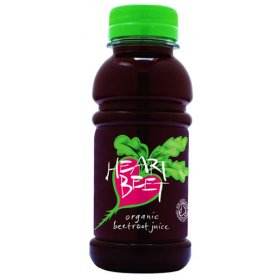 At the time of writing this blog, I have just turned 30. To celebrate this apparently momentous occasion (my view is that it’s all downhill from here!) a close friend of mine who is a chef baked me a birthday cake. The flavour: chocolate and beetroot.
At the time of writing this blog, I have just turned 30. To celebrate this apparently momentous occasion (my view is that it’s all downhill from here!) a close friend of mine who is a chef baked me a birthday cake. The flavour: chocolate and beetroot.
Now I know that may not sound like a good combination to some of you, but it was delicious and it inspired me to focus my blog this month on beetroot – a vegetable that has some fantastic performance enhancing powers that I would recommend to all rugby players.
What’s all the fuss about?
In short, a fair bit! There is a host of research available suggesting that the compounds found naturally in beetroot, called Nitrates, have shown to increase blood flow to muscles by increasing vasodilation (widening of blood vessels bought about by smooth muscle in arteries relaxing) of cells, meaning that more blood can get to them. As we all know, blood carries oxygen around your body, so put simply:
More oxygen to your muscles = Increased time to fatigue = Increased performance
Potential to Enhance Recovery?
I caught up with a mate of mine recently (who is also a performance nutritionist) for a bite to eat and we got on to talking about nitrates as a potential aid for recovery.
Nitrates increase blood flow to muscles (which in itself would benefit recovery) but increased blood flow to a muscle = increased nutrients within your blood reaching the tissues (i.e. muscle), which would aid recovery. So the theory is there for beetroot to be used for post-exercise recovery .
However, I must stress that this is just a theory of ours and I am not aware of any research carried out that validate that nitrates impact on exercise recovery (probably due to the fact that to measure this effectively it would be incredibly invasive and difficult to quantify).
Health Benefits
 Now, beetroot is not just for the rugby player at the height of their career that want to fly around the pitch at 100mph.
Now, beetroot is not just for the rugby player at the height of their career that want to fly around the pitch at 100mph.
For the more ‘seasoned’ campaigner, the vasodilatory powers of Nitrates can actually help benefit a number of other ways. For example, by increasing your nitrate intake and relaxing the muscles in your arteries, research suggests that you can actually lower blood pressure since the blood is being met with less resistance in your arteries. So for those of you that suffer from heart problems or high blood pressure, it wouldn’t hurt to add a little beetroot to your diet!
Where can I get Nitrates?
This one is pretty straight forward – you can get it from beetroot or beetroot juice, which is commonly available at the local supermarket. If you want to go down the supplement route, Nitric Oxide is available from most supplement manufacturers, which acts in the same way.
How do I cook beetroot?
You can roast it, boil it, steam it, juice it or stir-fry it – or simply buy them pre-cooked and throw them in to a salad – easy!
I’ve attached a few videos with recipe ideas below (please note that some of the commentary isn’t backed up by my research – just focus on the cooking methods and NOTHING ELSE), including a chocolate & beetroot cake one. I have no idea if it is the same recipe my friend used, but I’m sure it will be good either way!
Overall, beetroot is a food that is often over-looked, but is a great source of nitrates that is proving to be highly useful when it comes to exercise and increasing performance.
Many top-level clubs use beetroot or beetroot juice as a natural way of increasing blood flow to muscles through vasodilation – so why not try adding beetroot to your weekly shopping basket?
The increased oxygen to your muscles may lead to you increasing your performance!
And if you’re still not sold on the idea, it gives you a great reason to eat beetroot and chocolate cake more often (everything in moderation is my ‘official’ stance on the matter)!
Chris
www.facebook.com/totalnutritionltd
Twitter: @nutrition_total








 When most people hear the word “Peloton” they think of an expensive black bike with shiny red buttons and that controversial commercial where the husband gifted his wife a Peloton for Christmas.
When most people hear the word “Peloton” they think of an expensive black bike with shiny red buttons and that controversial commercial where the husband gifted his wife a Peloton for Christmas. If the app interests you, Peloton is currently offering a 30 day FREE TRIAL, so why not give it a try? Check it out
If the app interests you, Peloton is currently offering a 30 day FREE TRIAL, so why not give it a try? Check it out 

 This article would not be complete, however, if we did not acknowledge some of the delivery issues that have been plaguing Peloton over the last year. Most of the delivery issues seem to affect U.S. deliveries, however, the UK deliveries have been affected as well.
This article would not be complete, however, if we did not acknowledge some of the delivery issues that have been plaguing Peloton over the last year. Most of the delivery issues seem to affect U.S. deliveries, however, the UK deliveries have been affected as well.







